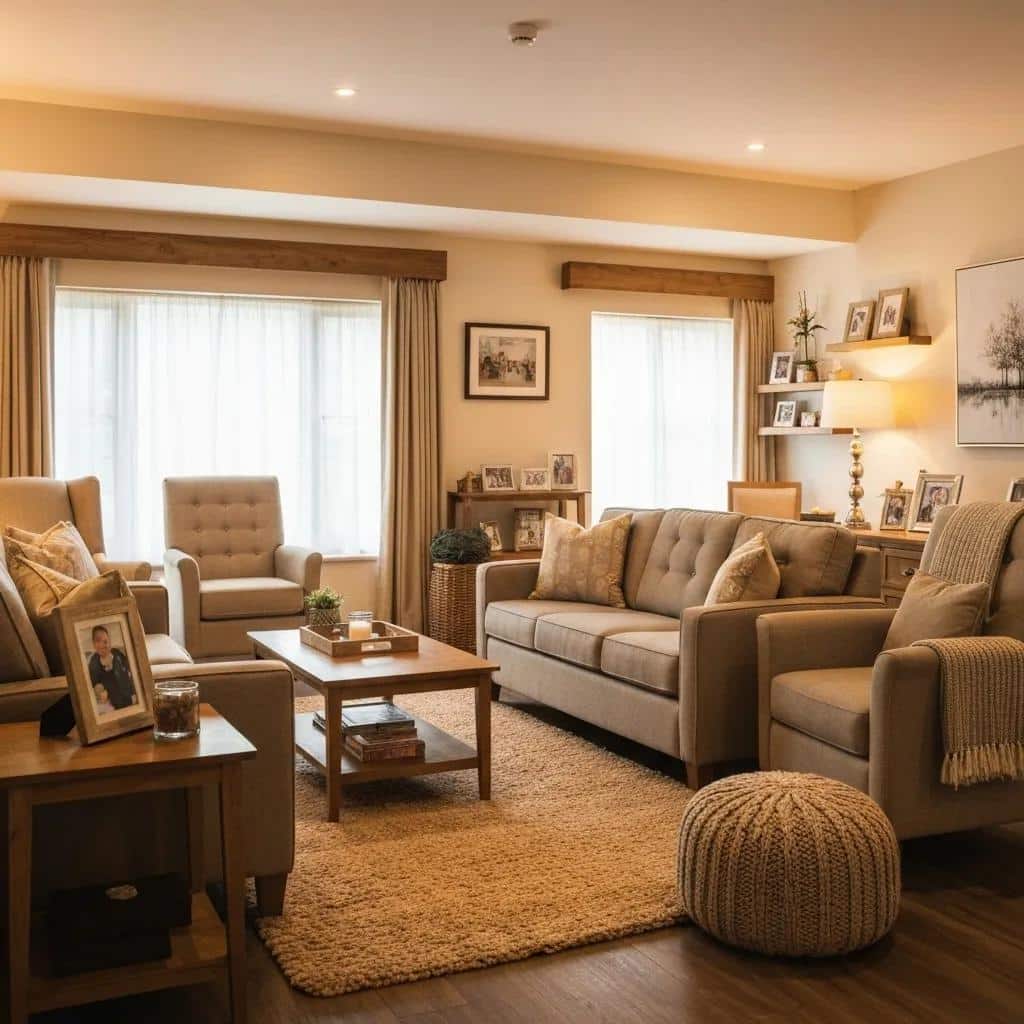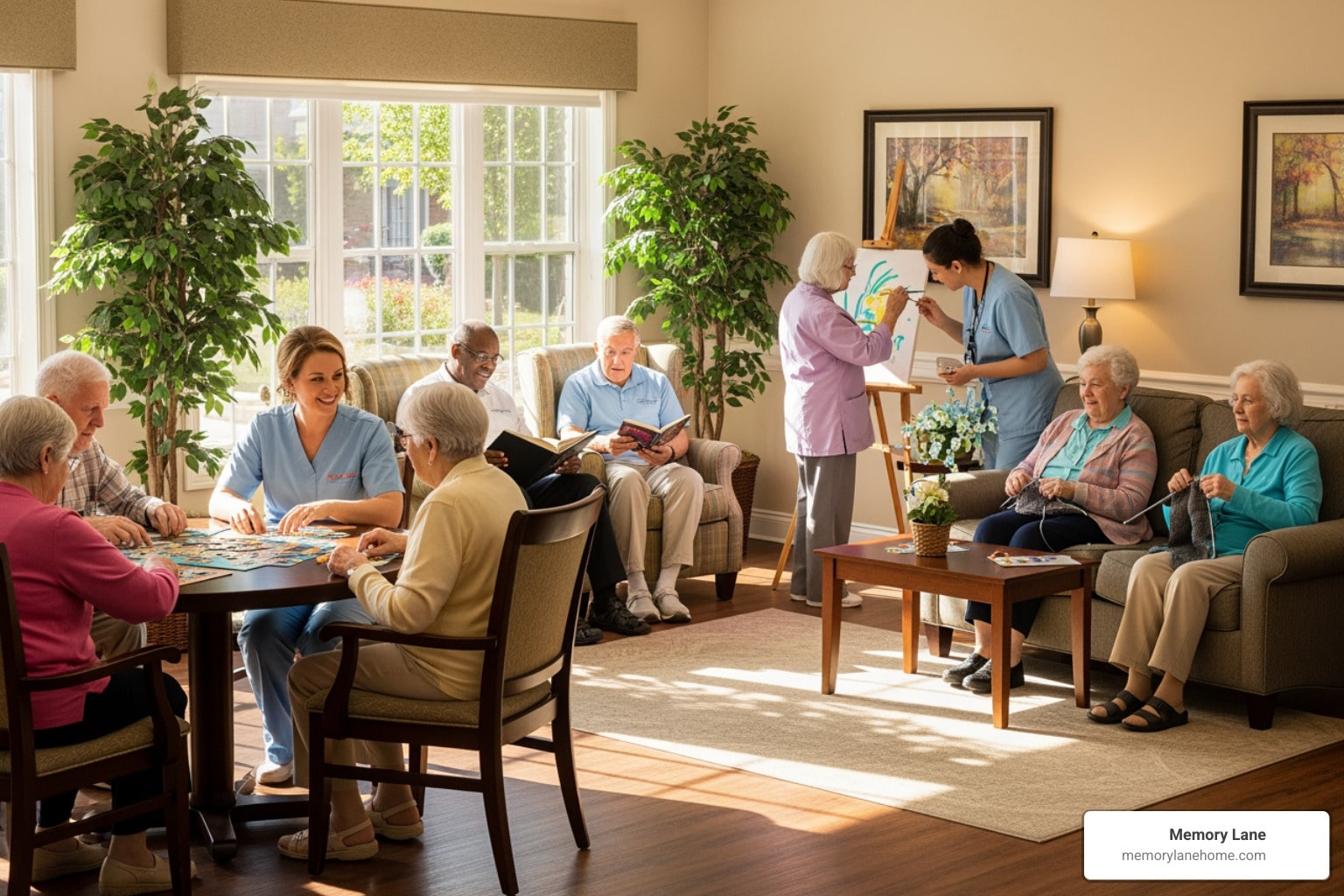Your guide to assisted living Michigan: explore costs, services, financial aid, and top communities for senior care.

Alzheimer’s Care Facilities Near Saline MI Explained
Alzheimer’s Care Facilities Near Saline MI Explained

Alzheimer’s Memory Care Near Saline, MI: Costs & Selection Guide
Navigating the landscape of Alzheimer’s care facilities near Saline, MI can feel overwhelming for families seeking a home-like environment with personalized memory support. This guide delivers clear definitions of memory care, transparent cost ranges, decision-making criteria, local support resources, and an overview of how Memory Lane Home’s specialized approach ensures individualized attention in residential dementia care. You’ll learn what distinguishes memory care from assisted living, how to budget for care, strategies for selecting a facility, community-based caregiver support, and why Memory Lane Home stands out for its high caregiver-to-resident ratio and compassionate atmosphere.
What Is Memory Care and How Does It Differ from Assisted Living in Saline MI?
Memory care is a specialized form of senior care designed to support individuals living with Alzheimer’s disease, dementia, and other memory-related conditions. Facilities that provide memory care focus on creating a safe and nurturing environment tailored to the unique needs of residents experiencing cognitive decline. These communities often feature structured daily activities that emphasize both mental stimulation and emotional well-being. With specially trained staff available around the clock, individuals receive personalized care that includes assistance with daily tasks, medication management, and social engagement, ensuring that their physical, emotional, and cognitive needs are met.
In contrast, assisted living communities in Saline, MI, offer a more generalized approach to senior care, catering to individuals who may require help with daily activities like bathing, dressing, and meal preparation but do not necessarily have memory impairment issues. Assisted living facilities focus on promoting independence while providing necessary support, enabling residents to maintain a certain level of autonomy. While both memory care and assisted living share the goal of improving the quality of life for seniors, the primary difference lies in the level of care and the specific focus on cognitive support in memory care. Understanding these distinctions is essential for families considering care options for their loved ones, as it ensures that individuals receive the appropriate level of support based on their unique needs.
Memory care is a specialized form of residential support designed to address the unique cognitive and safety needs of individuals with Alzheimer’s disease and other forms of dementia. By combining secure environments, structured routines, and trained dementia caregivers, memory care enhances quality of life and reduces disorientation incidents.
What Defines Memory Care for Alzheimer’s and Dementia Patients?
Memory care provides tailored interventions that support cognitive function, emotional well-being, and daily living activities for residents with memory impairment. Key characteristics include:
- Secure, wander-management layouts that prevent accidental exits
- Staff trained in dementia-specific communication and behavior management
- Customized daily routines to reinforce orientation and independence
- Cognitive stimulation programs that promote recall and social engagement
These features strengthen residents’ safety and comfort, leading naturally into the critical question of how memory care compares with standard assisted living.
How Is Memory Care Different from Assisted Living?
Residential care services vary widely. The table below contrasts memory care and assisted living in Saline, MI along core dimensions.
Smaller, focused memory care environments like residential dementia homes provide more precise interventions than broader assisted living settings, setting the stage for understanding the benefits of intimate care models.
Memory care facilities offer specialized support for individuals with dementia, including secure environments and staff trained in dementia-specific care, unlike assisted living facilities that provide general assistance with daily tasks. These specialized features are designed to enhance the quality of life for residents with cognitive impairments.
Alzheimer’s Association, “Memory Care vs. Assisted Living” (2024)
Why Choose Residential Dementia Care Homes Over Larger Facilities?
Smaller dementia homes emphasize personalized relationships, consistency in staffing, and homelike design elements that foster comfort and familiarity. Key advantages include:
- Limited resident counts for strong caregiver bonds
- Consistent daily routines to reduce anxiety
- Home-style kitchens, private rooms, and communal living areas
- Enhanced family involvement and open communication channels
These factors nurture emotional security, leading families to explore cost considerations and financial planning next.
How Much Does Alzheimer’s and Memory Care Cost in Saline MI?
When considering the cost of Alzheimer’s and memory care in Saline, MI, families often face a significant financial decision. The expenses associated with memory care services can vary widely based on a range of factors, including the type of facility, the level of care required, and the amenities offered. On average, residents in Saline can expect to pay between $3,500 and $7,500 per month for specialized memory care services. This investment often encompasses 24-hour supervision, personalized care plans, and therapeutic activities specifically designed to engage those suffering from cognitive impairments.
In addition to the monthly fees, families should also be aware of potential extra costs that may arise, such as specialized medical treatments, transportation services, or additional personal care assistance. Many facilities may offer various levels of care depending on the individual’s needs, which can lead to fluctuating costs as the disease progresses. To make informed financial decisions, it is advisable for families to research various care options, understand what each facility includes in its fee structure, and consider the long-term financial implications of Alzheimer’s and memory care in their local area. Engaging with local resources or financial advisors who specialize in elder care can also provide valuable insights into planning for these expenses.

Understanding memory care costs in Saline, MI is essential for financial planning and selecting a facility that matches both care needs and budget constraints. Costs depend on level of care, amenities, and staffing models.
What Are the Average Memory Care Costs in Saline and Surrounding Areas?
Average monthly costs for memory care in Saline and nearby communities reflect facility size, services included, and location premium.
The cost of memory care varies depending on the facility type, with small residential homes typically costing less than larger memory care communities or campuses. These costs are influenced by factors such as staffing ratios, amenities, and the level of care provided.
Genworth, “Cost of Care Survey” (2024)
Does Medicaid Cover Memory Care Costs in Michigan?
In Michigan, Medicaid may cover a portion of memory care expenses through the Home and Community-Based Services (HCBS) waiver and Nursing Facility Level of Care when eligibility criteria are met. Applicants must demonstrate financial need and a documented medical necessity for dementia-specific support, after which the state coordinates payment directly with licensed care providers.
Families often pursue additional aid to bridge remaining costs.
What Other Financial Assistance Options Are Available for Alzheimer’s Care?
Beyond Medicaid, several programs can defray memory care expenses:
- Veterans Aid & Attendance pension allowances for eligible veterans and spouses
- Michigan Alzheimer’s Disease Program grants for diagnostic and support services
- Long-term care insurance policies that cover cognitive impairment care
- Charitable foundations offering emergency relief for dementia families
Exploring these options can significantly ease the financial burden, preparing families to evaluate facility quality and personalized care factors.
How to Choose the Best Alzheimer’s Care Facility Near Saline MI?
Choosing the best Alzheimer’s care facility near Saline, MI, is a critical decision that involves careful consideration of various factors. First and foremost, families should prioritize facilities that specialize in memory care, as these environments are specifically designed to cater to the unique needs of individuals with Alzheimer’s disease and other forms of dementia. It is essential to assess the staff-to-resident ratio, ensuring that the employees are adequately trained and equipped to provide compassionate care tailored to the challenges posed by cognitive impairments. Visiting prospective facilities and observing interactions between staff and current residents can offer valuable insights into the quality of care being provided.
Additionally, evaluating the amenities and activities available at a facility can help families determine which environment best aligns with their loved one’s preferences and needs. Engaging activities that stimulate both mental and physical well-being are crucial in managing Alzheimer’s symptoms and enhancing quality of life. Families should also consider the facility’s safety features, such as secure outdoor areas and a well-designed layout that minimizes the risk of wandering. Lastly, it’s advisable to gather feedback from current residents and their families to gauge satisfaction levels and overall care experience. By taking these important steps, families can make a well-informed choice that prioritizes their loved one’s comfort and well-being in an Alzheimer’s care facility.
Selecting an optimal facility requires balancing clinical support, environment, and resident engagement. A systematic approach ensures families make informed decisions.
What Role Does Caregiver-to-Resident Ratio Play in Quality Dementia Care?
A lower caregiver-to-resident ratio enables staff to deliver individualized attention, monitor behavioral changes promptly, and maintain consistent routines. In Memory Lane Home’s residential setting, a 1:6 ratio ensures:
- Swift response to resident needs
- Thorough understanding of personal histories and triggers
- Enhanced safety during transitions and activities
This level of attentiveness directly influences the development of customized care plans.
How Are Personalized Care Plans Developed for Seniors with Dementia?
Care plans emerge from a collaborative assessment process that includes:
- Clinical Evaluation: Review of medical history, cognitive assessments, and physical abilities
- Life Story Interview: Gathering personal preferences, routines, and meaningful pastimes
- Goal Setting: Defining objectives for nutrition, mobility, and social engagement
- Ongoing Review: Regular adjustments based on health changes and resident feedback
This tailored methodology ensures care evolves alongside resident needs, smoothing the way for enriching activities that promote well-being.
What Therapeutic and Engaging Activities Enhance Quality of Life for Memory Care Residents?
Activity programs in specialized homes blend cognitive exercises with sensory stimulation:
- Music and reminiscence therapy to evoke positive memories
- Art and craft sessions supporting fine motor skills and self-expression
- Gentle fitness classes adapted for balance and strength
- Garden walks and horticultural therapy for sensory engagement
Structured activities reinforce daily routines and foster social connections, guiding families to explore broader support networks.
What Support Resources Are Available for Dementia Caregivers and Families in Saline MI?

Caring for a loved one with Alzheimer’s can challenge families emotionally and physically. Local resources offer education, respite, and community.
Where Can Caregivers Find Local Dementia Support Groups and Respite Care?
Caregivers supporting individuals with dementia often face unique challenges that can be alleviated through community resources, such as local support groups and respite care services. Finding these resources, however, can sometimes be daunting. A wealth of information is available online; various organizations, such as the Alzheimer’s Association, provide directories where caregivers can locate support groups tailored to their specific geographical areas. These groups not only offer emotional support but also the opportunity for caregivers to share experiences and practical advice, ultimately fostering a sense of community among those navigating similar journeys. Several community organizations host support networks and respite services:
- Alzheimer’s Association Washtenaw County Chapter support circles
- Dementia Friendly Saline volunteer-led caregiver meetups
- Local adult day programs providing monitored daytime relief
- County aging services coordinating short-term residential respite
How Does Dementia Friendly Saline Support Families and Caregivers?
Dementia-friendly saline initiatives play a crucial role in supporting families and caregivers navigating the complex challenges associated with caring for individuals with dementia. These programs focus on creating an environment that is sensitive to the unique needs of both the individuals suffering from dementia and their caregivers. By fostering community awareness and understanding about dementia, these initiatives help reduce stigma and isolation, enabling families to access resources and support systems more readily. This supportive environment encourages open discussions about the illness, allowing caregivers to share their experiences and emotions with others who can relate, thereby alleviating feelings of loneliness and providing emotional relief. Dementia Friendly Saline trains businesses, faith communities, and civic groups to recognize and assist individuals with cognitive impairment. Their initiatives include educational workshops, public awareness campaigns, and partnerships with care facilities to ensure safe, supportive experiences across town. Community involvement complements facility-based services and underscores the importance of holistic dementia care.
What Educational Resources Help Families Navigate Alzheimer’s Care in Michigan?
Navigating the complexities of Alzheimer’s care can be particularly challenging for families in Michigan, but a variety of educational resources are available to support them through this journey. The Michigan Department of Health and Human Services provides an array of informational materials, including guides on caregiving, understanding Alzheimer’s disease, and accessing state-funded services. These resources help families make informed decisions about care options, while also outlining the rights and dignities of those living with Alzheimer’s. Additionally, the Michigan Alzheimer’s Association offers a wealth of programs, workshops, and support groups tailored to caregivers and families. These initiatives not only educate families on the progression of the disease but also empower them to develop practical caregiving strategies. Authoritative materials empower families with knowledge:
- Michigan Department of Health and Human Services dementia care guidelines
- Alzheimer’s Association online webinars and local workshops
- MemoryCare.com cost calculators and comparison tools
- Senior advocacy organizations offering legal and financial planning advice
Access to up-to-date information reinforces confident decision-making at every stage.
What Makes Memory Lane Home a Unique Memory Care Facility Near Saline MI?
Memory Lane Home stands out as a distinctive memory care facility near Saline, MI, through its commitment to providing a nurturing and supportive environment for individuals living with memory-related conditions. One of the key aspects that sets Memory Lane Home apart is its home-like atmosphere, which fosters a sense of familiarity and comfort for residents. Rather than a traditional institutional setting, the facility is designed to resemble a cozy home, complete with personalized rooms and common areas that encourage social interaction. This design philosophy helps residents feel more at ease, reducing anxiety and promoting emotional well-being.
In addition to its inviting ambiance, Memory Lane Home features a highly trained staff dedicated to compassionate care. Each caregiver is equipped with specialized knowledge about memory challenges, allowing them to tailor their approach to meet the unique needs of each resident. Activities at the facility focus on cognitive engagement and sensory stimulation, utilizing techniques that help residents engage with their memories in meaningful ways. This combination of a supportive environment and personalized attention ensures that residents at Memory Lane Home not only receive the care they need but also enjoy an enriched quality of life, making it a truly unique and exceptional choice for memory care in the Saline area.
Memory Lane Home specializes in residential dementia care that balances clinical expertise with a homelike atmosphere, ensuring residents thrive.
How Does Memory Lane Home Create a Home-Like Environment for Residents?
Memory Lane Home excels in creating a truly home-like environment for its residents by weaving together thoughtful design, personalized care, and a strong sense of community. At the heart of their approach is a commitment to understanding the unique backgrounds and stories of each resident. By incorporating familiar elements from their past, such as personalized room decor and community spaces that reflect local culture, Memory Lane Home fosters a comforting atmosphere reminiscent of a personal home. This attention to detail not only makes residents feel welcomed but also provides them with a sense of identity and belonging, which is crucial for emotional well-being, especially for those facing the challenges of memory loss. Every Memory Lane Home residence incorporates:
- Comfortable private bedrooms styled with personal touches
- Warm kitchens and dining rooms for family-style meals
- Secure outdoor patios and walking paths with memory-boxes
- Familiar décor and resident memory cues throughout common areas
What Is the Caregiver-to-Resident Ratio at Memory Lane Home and Why Does It Matter?
At Memory Lane Home, the caregiver-to-resident ratio serves as a fundamental metric for evaluating the quality of care provided to residents, particularly those facing cognitive challenges such as Alzheimer’s or other forms of dementia. This ratio reflects the number of caregivers available to support a specific number of residents. A lower ratio generally indicates a higher level of personalized attention, which is vital for the well-being and safety of residents. With caregivers readily available to assist with daily living activities, respond to behavioral changes, and provide emotional support, residents benefit from a nurturing environment that caters to their unique needs. With one trained dementia caregiver for every six residents, Memory Lane Home delivers:
- Immediate response to sundowning or confusion episodes
- Consistent staffing that builds trust and understanding
- Flexible scheduling to honor individual sleep-wake cycles
This ratio fosters personalized supervision and meaningful connections, enhancing resident dignity and safety.
What Do Families Say About Their Experience with Memory Lane Home?
Families who have chosen Memory Lane Home for their loved ones often share heartfelt testimonials about their experiences, highlighting the compassionate and personalized care provided by the staff. Many find comfort in the home-like atmosphere that Memory Lane fosters, which is designed to feel less institutional and more inviting. Families appreciate how the staff members take the time to understand each resident’s unique history and preferences, ensuring that their needs are met with genuine attention and respect. This tailored approach not only enhances the quality of life for residents but also brings peace of mind to family members who may otherwise feel anxiety about their loved ones’ new living arrangements. Families consistently highlight:
- Improved emotional stability and daily engagement for their loved ones
- Transparent communication and proactive updates from caregivers
- Genuine warmth and respect shown by staff members
These testimonials reflect the facility’s commitment to compassionate, individualized dementia care.
What Are the Different Types of Alzheimer’s and Dementia Care Facilities Near Saline MI?
When it comes to Alzheimer’s and dementia care, families in the Saline, MI area have a variety of facility options designed to meet the unique needs of their loved ones. Alzheimer’s care facilities specialize in creating an environment tailored to the specific challenges individuals with Alzheimer’s face, such as memory loss, confusion, and the need for constant supervision. These facilities often incorporate structured routines, engaging activities, and trained staff who understand how to communicate effectively with patients suffering from cognitive decline. This structured approach not only ensures safety but also promotes a sense of familiarity and comfort, which can significantly enhance the quality of life for residents.
In addition to specialized Alzheimer’s care, there are various assisted living and memory care environments that cater to individuals with broader dementia-related challenges. Memory care units are typically housed within larger assisted living communities but provide a secure setting with heightened safety measures. These facilities focus on fostering independence while also ensuring that residents receive the support they need. Care practices may include tailored exercise programs, cognitive stimulation, and social activities designed to engage residents while accommodating their cognitive capabilities. Families exploring dementia care options near Saline will find that facility selection should consider not only the level of care required but also the specific services offered, staff qualifications, and the overall atmosphere of the environment. Each facility aims to create a nurturing space where residents can maintain their dignity and quality of life amidst the challenges of dementia.
Families benefit from understanding the spectrum of care environments before making a choice.
What Are Residential Memory Care Homes and Their Benefits?
Residential memory care homes are specialized living environments designed to provide support and care for individuals with memory-related conditions, such as Alzheimer’s disease or other forms of dementia. These homes offer a secure and structured setting where residents receive personalized care tailored to their specific needs. Unlike traditional assisted living facilities, memory care homes employ staff who are specifically trained to understand and manage the challenges associated with cognitive impairments. The layout and environment of these homes are typically designed to reduce confusion and enhance memory cues, providing a sense of familiarity and comfort for residents Residential memory care homes are small-scale residences licensed to support six to twelve seniors with dementia. They offer homelike design, highly personalized programming, and familiar staff assignments that reduce confusion.
How Do Larger Memory Care Communities Compare?
When considering memory care options for loved ones, individuals often find themselves weighing the benefits of larger memory care communities against smaller facilities. Larger communities typically offer a wider range of services and amenities, such as specialized therapeutic programs, round-the-clock staff access, and a variety of recreational activities designed to engage residents. These facilities are usually better equipped with state-of-the-art technologies and resources aimed at enhancing the quality of life for residents with cognitive impairments. In addition, larger communities may provide greater opportunities for social interaction, potentially reducing feelings of isolation and enhancing emotional well-being for those living with memory-related conditions. Larger campuses may accommodate dozens of residents across multiple care levels. They typically provide a broader range of amenities—such as therapy gyms and on-site healthcare—but may have higher staff turnover and a less intimate atmosphere.
How to Compare Memory Care Facilities Based on Services, Environment, and Cost?
When searching for the right memory care facility, it is essential to consider several critical factors that contribute to the overall quality of care and the well-being of residents. The evaluation process begins with a thorough comparison of services offered at various facilities. Many memory care facilities provide a range of support tailored to the unique needs of individuals with cognitive impairments, including personalized care plans, engaging social activities, and specialized therapeutic programs. Prospective families should inquire about the staff-to-resident ratio and the training of caregivers, ensuring that the facility fosters a supportive environment conducive to maintaining residents’ dignity and enhancing their quality of life. When evaluating options, consider these top criteria:
Balancing these dimensions helps families select the facility that best aligns with their loved one’s needs and financial considerations.
Frequently Asked Questions
What should I consider when evaluating the location of a memory care facility?
When evaluating the location of a memory care facility, consider proximity to family and friends, accessibility for visits, and the surrounding community’s resources. A facility close to loved ones can enhance emotional support for residents. Additionally, check for nearby medical services, parks, and community centers that can provide additional engagement opportunities. Safety of the neighborhood is also crucial, as it contributes to the overall peace of mind for families and residents alike.
How can I assess the quality of care provided at a memory care facility?
To assess the quality of care at a memory care facility, look for accreditation, staff qualifications, and resident-to-staff ratios. Visit the facility to observe interactions between caregivers and residents, and ask about staff training in dementia care. Additionally, inquire about the facility’s approach to personalized care plans and how they adapt to individual needs. Reviews and testimonials from current residents’ families can also provide valuable insights into the quality of care offered.
What types of activities are typically offered in memory care facilities?
Memory care facilities often provide a variety of activities designed to engage residents cognitively and socially. Common offerings include music therapy, art classes, gardening, and exercise programs tailored to residents’ abilities. Structured activities help maintain cognitive function and promote social interaction, which can enhance overall well-being. Facilities may also organize outings to local attractions or events, fostering a sense of community and connection outside the facility.
How can families stay involved in the care of their loved ones in memory care?
Families can stay involved in their loved ones’ care by maintaining open communication with facility staff and participating in care plan meetings. Regular visits can help families monitor their loved ones’ well-being and engage in activities together. Many facilities encourage family involvement through support groups, educational workshops, and social events. Establishing a routine for visits and communication can strengthen relationships and ensure that families remain informed about their loved ones’ progress and needs.
What should I know about the transition process into a memory care facility?
The transition to a memory care facility can be challenging for both residents and families. It’s important to prepare emotionally and practically. Familiarize your loved one with the new environment by visiting beforehand and discussing what to expect. Bring personal items that provide comfort, such as photos or favorite belongings. Staff should provide support during the transition, helping residents adjust to their new routines. Open communication with caregivers can ease concerns and facilitate a smoother adjustment period.
Are there specific dietary considerations in memory care facilities?
Yes, dietary considerations in memory care facilities are crucial for residents’ health and well-being. Facilities typically offer meals tailored to meet the nutritional needs of seniors, including those with specific dietary restrictions or preferences. It’s important to inquire about the availability of specialized diets, such as low-sodium or diabetic-friendly options. Additionally, facilities may provide assistance with eating for residents who have difficulty, ensuring that all residents receive adequate nutrition in a supportive environment.
What role do family support services play in memory care?
Family support services are essential in memory care, providing resources and assistance to caregivers and families. These services may include educational workshops, counseling, and respite care options to help families manage the emotional and physical demands of caregiving. Support groups can offer a space for families to share experiences and strategies. By utilizing these services, families can enhance their understanding of dementia care, reduce stress, and foster a supportive community around their loved ones.
How Do I Schedule a Tour or Consultation at a Memory Care Facility?
Scheduling a tour or consultation at a memory care facility is a crucial step for families seeking the best environment for their loved ones dealing with memory-related conditions. To initiate this process, individuals typically begin by researching local facilities, either through online searches or recommendations from healthcare professionals. Most memory care facilities have user-friendly websites where potential clients can find information about their services, amenities, and staff qualifications. It is often helpful to compile a list of questions and concerns beforehand, ensuring that families can make the most of their visit. Scheduling a visit typically involves:
- Contacting the facility by phone or online inquiry form
- Providing basic medical and care requirement information
- Selecting a convenient date and time for a guided tour
- Meeting with care staff to review personalized assessment procedures
Planning visits early allows families to compare multiple facilities and observe daily routines firsthand.
What Questions Should I Ask When Touring a Memory Care Facility?
When considering a memory care facility for a loved one, it’s essential to approach the decision with a well-prepared set of questions. The quality of care, environment, and staff engagement can significantly impact the well-being of residents. Prospective residents and their families should inquire about the facility’s approach to personalized care. Questions like, “How do you create individualized care plans for residents?” and “What types of activities are available to enhance cognitive stimulation?” can provide insights into the facility’s commitment to addressing the unique needs of individuals with memory impairments. Effective touring questions focus on:
- Daily routines and caregiver continuity
- Staff training in dementia care and emergency protocols
- Resident engagement and therapeutic activity schedules
- Communication practices for family updates and care plan revisions
Preparing these inquiries in advance ensures families gather critical insights into facility operations and care philosophy.
How Can I Ensure Transparency in Memory Care Costs and Services?
To confirm financial clarity, families should:
- Request a detailed fee schedule outlining base rates, add-on services, and potential surcharges
- Inquire about Medicaid or insurance integration and billing processes
- Review contract terms for rate increases and refund policies
- Seek written explanations of all included amenities and excluded expenses
Establishing transparent financial communication builds trust and prevents unexpected charges. Families who follow these guidelines can navigate the Alzheimer’s care landscape in Saline, MI with confidence, knowing they’ve explored the full spectrum of memory care options. Navigating Alzheimer’s and dementia care requires balancing compassionate support, cost considerations, and personalized programming. By understanding memory care fundamentals, comparing facility types, leveraging financial and community resources, and recognizing Memory Lane Home’s unique residential approach, families can make informed choices that prioritize safety, engagement, and dignity for their loved ones.


